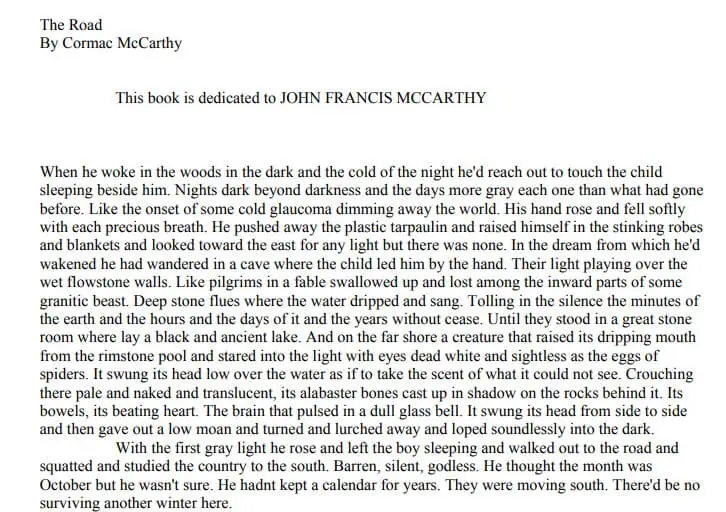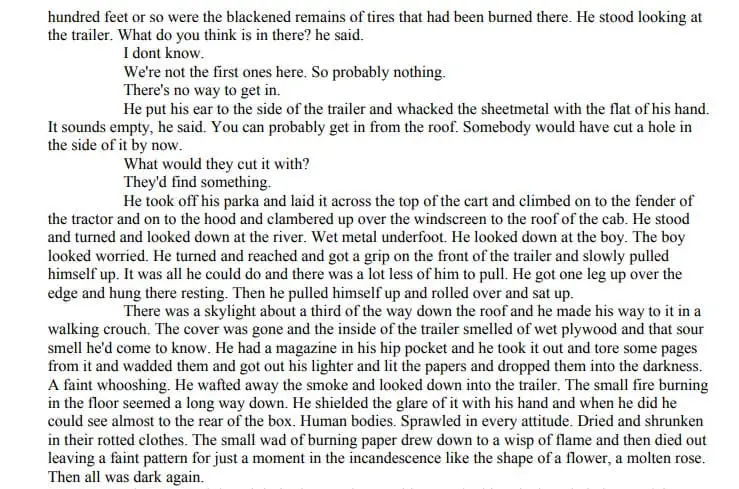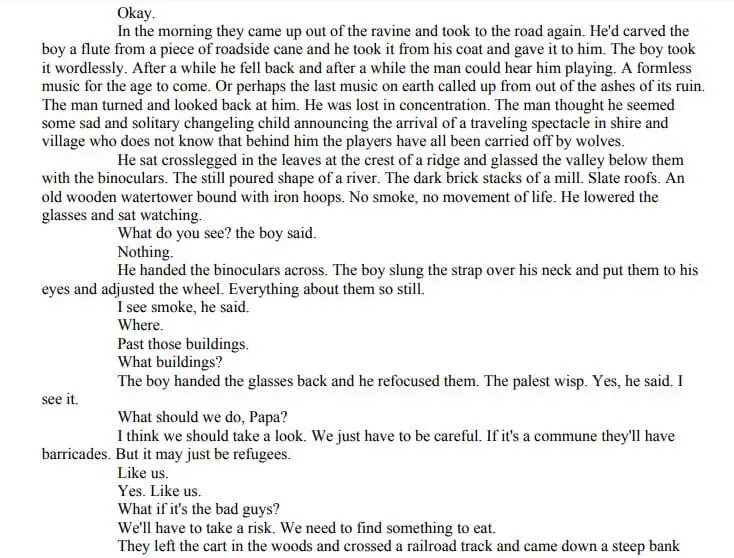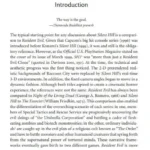Introduction
Cormac McCarthy’s The Road PDF is a hauntingly beautiful exploration of survival, love, and humanity in a post-apocalyptic world. Published in 2006, this Pulitzer Prize-winning novel delves into the unyielding bond between a father and his son as they navigate a barren landscape. Known for his stark prose and deep philosophical undertones, McCarthy cements his place as one of the most significant literary voices of our time with this work.
| Name of PDF | The Road Book |
|---|---|
| No Pages | 94 |
| Author | Cormac Mc Carthy |
| Originally Published | September 26, 2006 |
| Language | English |
| Genres | Adventure Fiction, Novel, Apocalyptic and post-apocalyptic fiction, Science fiction, Robinsonade, Dystopian Fiction |
| Size | 1.0 MB |
| Chek, latest edition |
Table of Contents

The Setting of The Road
The novel unfolds in a desolate, ash-covered world where humanity has all but perished. McCarthy’s vivid descriptions of a dying Earth—void of vegetation, animals, and sunlight—paint a grim backdrop. This setting is not just a place but a character in itself, influencing the actions and emotions of the protagonists.
Main Characters
The Unnamed Father
The father, whose name remains unknown, embodies resilience and sacrifice. He is fiercely protective of his son, driven by an unwavering determination to keep him alive.
The Son: A Symbol of Hope
The boy represents innocence and the flicker of hope in a world consumed by despair. His compassion and moral compass stand in stark contrast to the savagery around him.
Character Dynamics
The relationship between the father and son is the heart of the novel. Their interactions—ranging from tender moments of bonding to the father’s stern lessons on survival—highlight the depth of their connection.
Themes in The Road
Survival Against the Odds
The novel explores the sheer will to survive amidst insurmountable challenges. Every decision, from rationing food to avoiding hostile survivors, reflects the human instinct to endure.
The Essence of Humanity
In a world stripped of civilization, the book questions what it means to be human. The father and son cling to their moral code, distinguishing themselves as the “good guys” in a sea of chaos.
Hope Amidst Despair
The recurring image of carrying the “fire” symbolizes hope and the possibility of a better future.
The Struggle for Morality
The father often faces ethical dilemmas, balancing survival with his desire to instill values in his son. This struggle adds depth to his character and the story.
The Role of Memory and the Past
Through flashbacks, McCarthy contrasts the vibrant world of the past with the grim present. These moments provide insight into the father’s psyche and his longing for what once was.

The Writing Style of Cormac McCarthy
McCarthy’s sparse yet poetic writing style perfectly complements the bleakness of the story. His unconventional use of punctuation, such as the absence of quotation marks, creates a raw and immersive experience.
Symbolism in The Road
The Road as a Metaphor
The road is more than a physical path; it represents the journey of life, perseverance, and the quest for meaning.
Fire as a Symbol of Hope
The father and son’s mission to “carry the fire” is a powerful metaphor for maintaining humanity and hope.
The Role of Nature
Nature is both a threat and a refuge in the novel. The decaying environment mirrors the collapse of human civilization, while occasional moments of beauty offer solace.
Critical Reception
Awards and Recognition
The Road earned widespread acclaim, winning the Pulitzer Prize for Fiction and cementing McCarthy’s legacy.
Reader Interpretations
The novel’s open-ended narrative invites various interpretations, particularly regarding the father-son bond and the nature of hope.
Adaptations of The Road
The 2009 film adaptation, starring Viggo Mortensen, brought McCarthy’s vision to the big screen. While faithful to the novel, it added visual depth to the story.
Why The Road Remains Relevant
The novel’s exploration of universal themes like love, survival, and morality ensures its continued relevance. In a world grappling with crises, The Road serves as a poignant reminder of resilience.
Lessons from The Road
McCarthy’s work teaches us the importance of love, trust, and perseverance, even in the darkest of times.
Conclusion
The Road is a testament to the enduring power of storytelling. McCarthy’s haunting narrative and unforgettable characters leave a lasting impression, making it a modern classic that resonates deeply with readers.

FAQs about The Road PDF
What inspired Cormac McCarthy to write The Road?
McCarthy drew inspiration from his relationship with his young son and his fears about the future of humanity.
Is The Road suitable for all readers?
Due to its dark themes and graphic depictions, The Road is best suited for mature readers.
How does the novel differ from its film adaptation?
The film retains much of the novel’s essence but focuses more on visual storytelling, omitting some introspective elements.
What is the significance of the “fire” in The Road?
The fire symbolizes hope, humanity, and the perseverance to carry on despite adversity.
Why is The Road considered a modern classic?
Its timeless exploration of love, morality, and survival ensures its place as a cornerstone of contemporary literature.
Is The Road a love story?
It is the love between the characters, the Man and the Boy
Why is the book The Road so good?
Profoundly moving story of a journey
What is the main theme of the book The Road?
The challenge of survival
What is the book Road about?
A father and his son travel on foot to the southern coast, seeking a warmer climate in which to live out their days





